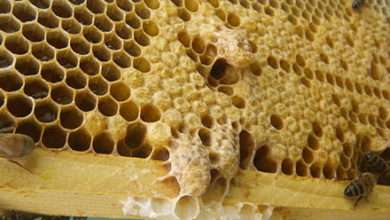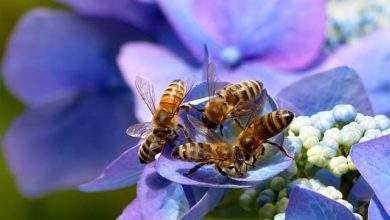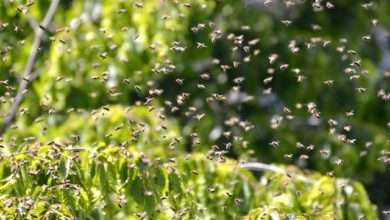Benefits of Beekeeping Prison Programs
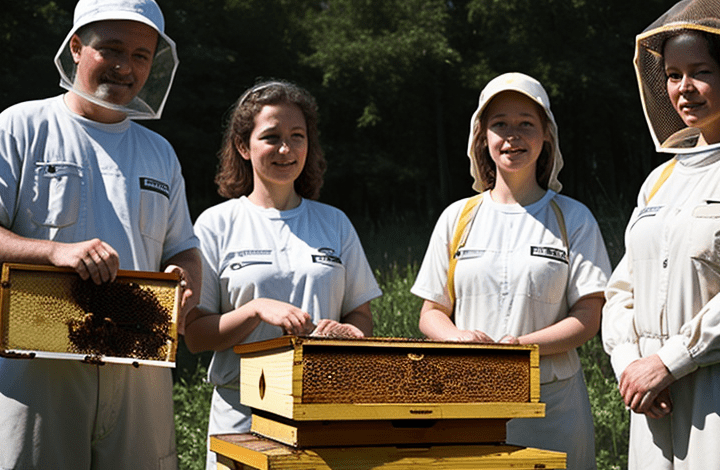
Beekeeping has long been recognized as a meaningful and rewarding practice. Its importance extends beyond the production of honey and beeswax, as it plays a vital role in ecosystem preservation and sustainability.
In recent years, a growing number of correctional facilities have implemented beekeeping programs within their walls, providing inmates with the opportunity to engage in this ancient craft.
In this article, we will explore the benefits of beekeeping prison programs and their potential for positive impact on incarcerated individuals.
The Concept of Prison Beekeeping Programs
Prison beekeeping programs have gained increasing popularity due to their transformative effects on inmates. These initiatives involve teaching incarcerated individuals the fundamentals of beekeeping, allowing them to actively participate in all aspects of the practice. Under careful supervision and guidance, inmates learn how to care for bees, maintain hives, harvest honey, and ensure the well-being of the colonies.
Benefits for Prisoners
Here is an overview of prison beekeeping programs and explore the benefits they offer to prisoners.
- Learning New Skills and Gaining Knowledge about Beekeeping
One of the primary benefits of prison beekeeping programs is the opportunity for prisoners to learn new skills and gain knowledge about beekeeping.
Through specialized training and hands-on experience, inmates acquire a deep understanding of beekeeping techniques, hive management, and honey production. This newfound expertise not only equips them with practical knowledge but also stimulates their curiosity and passion for a unique field of work.
- Job Prospects after Release
Another significant advantage of participating in prison beekeeping programs is the improved job prospects prisoners have upon release. Upon completion of the program, individuals gain a recognized certification for beekeeping, which can be highly beneficial when seeking employment in the beekeeping industry. This horticultural skill set opens doors to a variety of opportunities, including working as beekeepers, apiarists, or even starting their own beekeeping businesses. Empowering inmates with these skills significantly increases their chances of successful reintegration into society.
- Improved Mental Well-being and Sense of Purpose
Engaging in beekeeping within the prison environment offers inmates a sense of purpose and improved mental well-being. Beekeeping tasks, such as tending to beehives, collecting honey, and observing the intricate nature of these fascinating insects, can be therapeutic. Working with bees provides a calming effect, reducing stress levels and promoting mindfulness.
Moreover, the responsibility of nurturing and caring for a community of bees can instill a renewed sense of accomplishment and self-worth among the prisoners, fostering personal growth and emotional healing.
- Building Discipline, Responsibility, and Teamwork
Prison beekeeping programs also aim to instill important personal qualities and values among participants, such as discipline, responsibility, and teamwork. Beekeeping inherently requires adherence to a structured routine and the ability to follow specific protocols to maintain a harmonious environment for the bees. Inmates learn to prioritize and manage their time effectively, enhancing their self-discipline and organizational skills.
Moreover, the shared responsibility of caring for the beehives cultivates a sense of teamwork, teaching prisoners the value of cooperation and accountability.
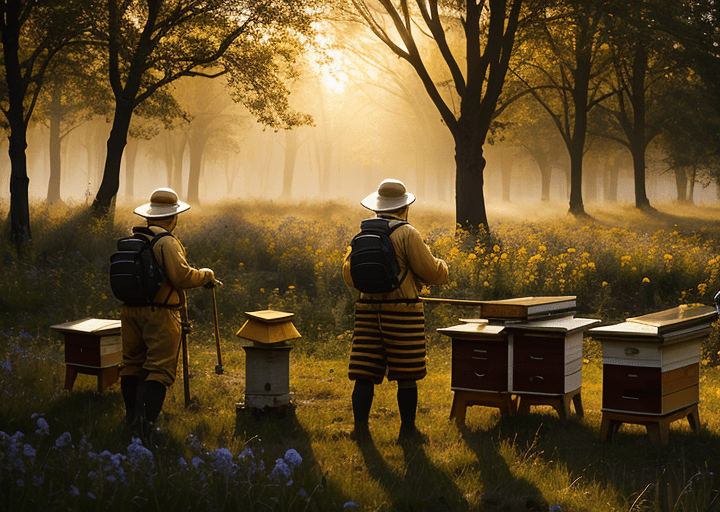
Benefits for Prisons
Prison beekeeping programs promote rehabilitation and reduce recidivism rates, but they also provide valuable opportunities for vocational training and education. Moreover, implementing beekeeping in prisons has proven to be a cost-effective alternative to traditional prison programs.
- Promoting Rehabilitation and Reducing Recidivism Rates
One of the key benefits of prison beekeeping programs lies in their ability to promote rehabilitation and reduce recidivism rates among inmates. Beekeeping requires responsibility, discipline, and patience, all of which are crucial skills for successful reintegration into society.
By participating in these programs, inmates can develop a sense of purpose, learn valuable life skills, and gain a sense of accomplishment. Through working with bees, individuals can also experience a therapeutic and calming effect, which can contribute to their overall emotional and mental well-being.
- Opportunities for Vocational Training and Education:
Prison beekeeping programs offer inmates the opportunity to gain vocational training and education in a unique and marketable field. Beekeeping provides a range of practical skills, including hive maintenance, honey extraction, pest management, and marketing of bee products.
These skills not only prepare inmates for potential employment opportunities upon release but also empower them to contribute positively to their communities.
Moreover, beekeeping can spark an interest in related fields, such as agriculture, environmental conservation, and entrepreneurship, opening doors to further educational pursuits.
- Cost-Effective Alternative to Traditional Prison Programs
Compared to other vocational training programs, prison beekeeping initiatives present a cost-effective alternative. Beekeeping requires minimal initial investment and maintenance costs, making it financially accessible for correctional facilities with limited resources.
Additionally, the labor-intensive nature of beekeeping allows for meaningful and productive use of inmate time. The honey and other bee products produced can be sold, providing a revenue stream that can be reinvested into the program, thus reducing dependency on external funding.
- Positive Impact on the Prison Environment and Morale
Implementing beekeeping programs within prisons has a positive impact on the overall prison environment and inmate morale. The presence of beehives introduces a calming and natural atmosphere within the facility, serving as a therapeutic escape from the harsh prison environment.
Inmates involved in beekeeping often experience a sense of responsibility and pride in their work, leading to improved self-esteem and a positive attitude.
Furthermore, these programs promote interpersonal skills and teamwork, as inmates collaborate to maintain the beehives and harvest honey, fostering a sense of community and cooperation within the prison walls.
Benefits for Local Communities and Environment
Prison beekeeping programs have not only proven to be effective in the rehabilitation of incarcerated individuals but have also emerged as impactful contributors to local communities and the environment.
- Increased Bee Population and Contribution to Ecosystems
Prison beekeeping programs play a significant role in bolstering the dwindling population of bees, which is essential for maintaining the delicate balance of ecosystems. Bees, as pollinators, are crucial for the reproduction and survival of numerous plant species, including fruits, vegetables, and wildflowers.
By maintaining beehives within prison perimeters, incarcerated individuals actively contribute to increasing the bee population. These programs provide inmates with an opportunity to learn about beekeeping techniques, promote bee health, and assist in the vital process of bee reproduction.
- Local Honey Production and Economic Opportunities
One of the most tangible benefits of prison beekeeping programs is the production of local honey. These programs not only generate a sustainable source of honey but also provide economic prospects for both incarcerated individuals and the communities surrounding correctional facilities.
The honey produced within prison beekeeping programs can be sold in local farmers’ markets, grocery stores, or directly to consumers. By tapping into the growing market demand for local and organic products, these programs open doors for job opportunities and skill development, enabling incarcerated individuals to acquire valuable vocational training.
- Strengthening Community Relationships and Public Perception of Prisons
Prison beekeeping programs serve as a catalyst for fostering stronger community relationships and improving public perception of correctional facilities. The integration of these programs within the prison system encourages partnerships with local beekeeping associations, agricultural organizations, and community members.
Through educational workshops and collaborative initiatives, these programs create a shared sense of purpose and mutual understanding between incarcerated individuals and the broader community.
By involving local residents, schools, and businesses in beekeeping activities, prisons can bridge the gap between correctional facilities and society, contributing to the successful reintegration of inmates upon their release.
Georgia Prison Beekeeping Program – Case Study
Here is an overview of the Georgia Prison Beekeeping Program.
Background Information
The Georgia Prison Beekeeping Program is a remarkable initiative that aims to provide incarcerated individuals with an opportunity for rehabilitation, education, and personal growth.
This program not only benefits the participating inmates but also contributes to the conservation and preservation of honeybees, which are crucial pollinators for our ecosystem.
How the Program Works
1. Training and Education:
- The program begins by selecting inmates who are interested in learning about beekeeping.
- These selected individuals undergo rigorous training and education on the basics of beekeeping, hive management, and honey production.
- Expert beekeepers provide hands-on instruction and support to ensure that the participants gain practical knowledge and skills.
2. Beehive Setup and Maintenance:
- Once trained, the inmates are responsible for setting up beehives within designated correctional facilities.
- The program provides all the necessary equipment, including protective gear and beehive materials.
- Inmates take charge of maintaining the beehives, including regular hive inspections, pest management, and honey harvesting.
3. Sustainable Honey Production:
- As the bee colonies thrive, the program focuses on sustainable honey production.
- Inmates learn sustainable beekeeping practices that prioritize the health and welfare of the honeybees.
- Honey harvested from the hives is then processed and given our free. In Georgia, inmates are not allowed to sell their honey.
4. Personal Development and Vocational Training:
- The Georgia Prison Beekeeping Program not only offers practical beekeeping skills but also aims to foster personal development and vocational training among the inmates.
- Participants develop a strong work ethic, responsibility, teamwork, and leadership qualities through their involvement in all aspects of the beekeeping process.
Partnerships and Organizations Involved
The success of the Georgia Prison Beekeeping Program relies on collaborations with various partnerships and organizations. These include:
1. Georgia Department of Corrections:
- The Georgia Department of Corrections plays a crucial role in implementing and overseeing the program within correctional facilities.
- They provide the necessary resources and infrastructure for the beekeeping initiative to thrive.
2. Georgia Beekeepers Association:
- The Georgia Beekeepers Association collaborates with the program by providing expert guidance, training, and ongoing support to both the inmates and correctional staff.
- Their expertise ensures that the beekeeping activities align with best practices and contribute to honeybee conservation efforts.
3. Local Communities:
- The program encourages interaction with local communities to raise awareness about the importance of honeybees and their impact on the environment.
- Inmates participate in educational outreach events, including school visits and community workshops, to share their knowledge and experiences.
Conclusion
Prison beekeeping programs provide incarcerated individuals with a unique opportunity for personal growth, skill acquisition, and preparation for a transformed future.
By offering practical knowledge, improving job prospects, enhancing mental well-being, and fostering discipline and responsibility, these programs contribute positively to the rehabilitative process of prisoners.
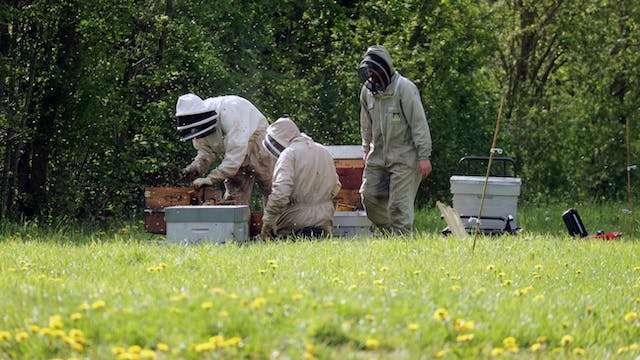
FAQ’s
What are beekeeping prison programs, and how do they benefit incarcerated individuals?
- Beekeeping prison programs involve training and teaching inmates the art and science of beekeeping within correctional facilities. These programs offer numerous benefits, including skill development, rehabilitation, and therapeutic aspects.
- Participants gain marketable skills and a sense of purpose, leading to increased chances of successful reintegration into society upon release.
How does beekeeping contribute to the rehabilitation of prisoners?
- Beekeeping offers prisoners a productive and meaningful activity, allowing them to develop discipline, responsibility, and teamwork. By engaging in outdoor work and tending to bees, inmates can experience a sense of connection to nature and life. This hands-on activity helps foster positive behavioral changes, promoting rehabilitation and reducing recidivism rates.
What environmental benefits do beekeeping prison programs offer?
- Beekeeping plays a vital role in environmental conservation by supporting the population and health of honeybees. Through these programs, inmates contribute to the preservation of pollinators, thus helping maintain biodiversity and ensuring the pollination of various plants, including crops and wildflowers. It also serves as an educational tool for sustainable practices and the importance of ecological balance.
How can beekeeping prison programs positively impact communities?
- Beekeeping programs in prisons can provide surplus honey and beeswax products to the local community, contributing to self-sufficiency and potential revenue generation.
- Additionally, by promoting bee-friendly practices and educating the public about the value of pollinators, these programs raise awareness and encourage environmental stewardship, benefitting the entire community.
How do beekeeping prison programs support mental health and well-being?
- Participating in beekeeping programs offers therapeutic benefits to inmates. The calming effect of working with bees and the outdoor environment can reduce stress, anxiety, and aggression among prisoners. It provides an opportunity for self-reflection, encourages social interaction, and helps develop patience, empathy, and a sense of accomplishment, ultimately improving mental well-being.
What safety measures are in place to protect participants in beekeeping prison programs?
- Beekeeping prison programs prioritize the safety and well-being of participants. Inmates receive thorough training on beekeeping techniques, proper clothing and gear usage, and the handling of bees. Correctional staff and experienced beekeeping instructors closely supervise all activities, ensuring inmate and public safety while maintaining a controlled and secure environment.
Are there any educational opportunities available within beekeeping prison programs?
- Beekeeping prison programs often integrate educational components that cover topics such as the life cycle of honeybees, their importance to ecosystems, and the scientific aspects of beekeeping.
- Inmates can learn about sustainable agricultural practices, honey production, and the positive effects of bees on the environment. This knowledge contributes to their personal growth and understanding of ecological systems.
How can individuals support beekeeping prison programs?
- There are several ways to support these programs. Individuals can spread awareness about the benefits of beekeeping prison programs in their communities, helping dispel misconceptions and advocating for their establishment.
- Donations, both financial and in kind, can aid in acquiring necessary tools, protective gear, and beehives. Supporting the purchase of honey and beeswax products produced by these programs also provides ongoing support and opportunities for participants.
